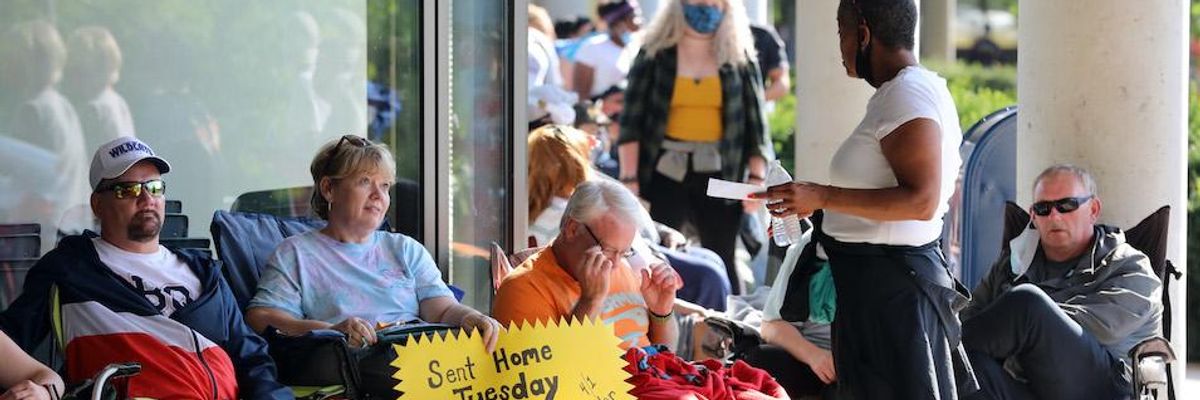A new study published Thursday reveals that the federal government's unemployment boost of $600 a week for Americans who lost their jobs due to the coronavirus pandemic helped reduce the nation's economic crash, making the case for extending the benefit as mass joblessness persists.
According to the study, the extra boost in benefits allowed households to spend 10% more on average compared to pre-crisis levels, a stinging condemnation of persistent low wages in the country and proof that the benefit is having it intended stimulative effect.
As Reutersreported, Thursday's study from the JPMorgan Chase Institute tracked spending from the onset of the pandemic in March through May:
Researchers analyzed transactions for 61,000 households that received unemployment benefits between March and May. Spending dropped for all households as the virus spread and led to business shutdowns, but then rose when households began receiving jobless benefits, the study found.
That contrasts with a typical recession, when households receiving unemployment benefits usually cut spending by 7% because regular jobless benefits amount to only a fraction of a person's prior earnings, the research found.
The increase in spending likely kept the economy afloat, researchers concluded, making the impending loss of the supplement at the end of July a ticking time bomb of financial disaster.
"Our estimates suggest that expiration will result in large spending cuts, with potentially negative effects on both households and macroeconomic activity," the researchers wrote.
The effects of the unemployment stimulus are being felt in retail as well, Bloomberg reported Thursday, which exceeded expectations.
According to Bloomberg:
The value of retail purchases increased 7.5% from the prior month after an upwardly revised record 18.2% surge in May, according to Commerce Department data out Thursday. The median estimate in a Bloomberg survey of economists called for a 5% gain for June.
But those gains are in danger if the unemployment benefit supplement runs out, Lydia Boussour and Gregory Daco, financial analysts with Oxford Economics, told Bloomberg.
"While today's report gives the illusion of a fearless consumer spending lavishly, the reality is more sobering: consumers are increasingly fearful amid new spikes in Covid-19 cases and a looming fiscal cliff," said Boussour and Daco.
Economic justice advocates also argued in favor of extending the benefit Thursday as unemployment numbers were released (pdf) showing the economic crisis is continuing with what the Economic Policy Institute (EPI) reported as another 2.4 million newly jobless people applying for aid when adjusted for both seasonal employment and the Pandemic Unemployment Assistance program.
EPI senior economist and director of policy Heidi Shierholz wrote Thursday that the nature of the employment crisis means aid is essential for keeping the economy from total disaster.
"There are 14 million more unemployed workers than job openings, meaning millions will remain jobless no matter what they do," Shierholz wrote. "Cutting off the $600 cannot incentivize people to get jobs that aren't there."
"The millions who will remain jobless after the extra $600 is cut off will have no choice but to drastically cut their spending, causing a sharp decline in their living standards, an increase in poverty, and completely unnecessary suffering," she added.

